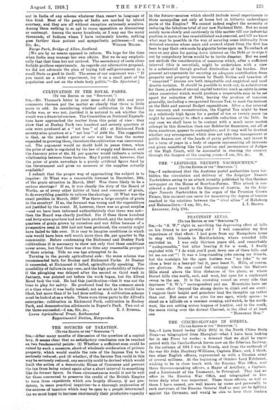CULTIVATION IN THE ROYAL PARKS.
[To THE EDITOR OF THE " SPECTATOR."]
Sin,—Mr. Thomas's letter in your issue of July 20th and your comments thereon put the matter so clearly that there is little more to add. In considering whether cultivation in the Royal Parks was, or was not, justified it is natural to ask whether the result was a financial success. The Committee on National Expendi- ture have approached the matter from this point of view : they show that at Bushey Park two hundred and seventy quarters of oats were produoed at a " net loss " of £11: at Richmond Park seventy-nine quarters at a " net loss " of £496 15s. The suggestion is that, as the market price of oats was less than the money expended in growing them, therefore the cultivation was uneconomi- cal. The argument would no doubt hold in peace times, when the price of oats is regulated by the law of supply and demand, and the January price of 45s. 3d. per quarter would indicate a certain relationship between these factors. May I point out, however, that the price of grain nowadays is a purely artificial figure fixed by the Government and gives no measure of the supplies actually available ?
I submit that the proper way of approaching the subject is to inquire: (1) What was a reasonable forecast in December, 1916, of the grain situation in March, 1918? Was there likely to be a serious shortage ? If so, it was clearly the duty of the Board of Works, as of every other holder of land and consumer of grain, to do everything possible to relieve the shortage. (2) What was the exact position in March, 1918? Was there a large surplus of grain in the country? If so, the forecast was wrong and the expenditure not justified by the event. If, however, there was no great surplus —and we have been informed authoritatively that there was not— then the Board was clearly justified. For if these three hundred and forty-nine quarters had not been produced, and the many other quarters of grain grown by ourselves and our Allies because of a prospective need in 1918 had not been produced, the country might have failed to tide over. It is easy to imagine conditions in which oats would have been well worth more than 43s. per quarter to the community. Before condemning the Richmond and Bushey Park cultivations it is necessary to show not only that those conditions never arose, but that there was at no time any reasonable prospect of their arising. This no one has attempted to do.
Turning to the purely agricultural side : the same scheme was recommended both for Bushey and Richmond Parks. At Bushey it succeeded, at Richmond it failed, agriculturally speaking. The possibility of failure in any case, and the high probability of failure if the ploughing was delayed after the second or third week in January, was pointed out before the work began, but Sir Alfred Mond took the risk. He had this justification—that it was not the time to play for safety. He produced food for the common stock at a time when it was badly needed; not as much as he would have liked, but more than if he had done nothing. A cultivation scheme must be looked at as a whole. There were three parts to Sir Alfred's enterprise : cultivation in Richmond Park, cultivation in Bushey Park, and demonstration allotments in Regent's Park. Two out of


























 Previous page
Previous page